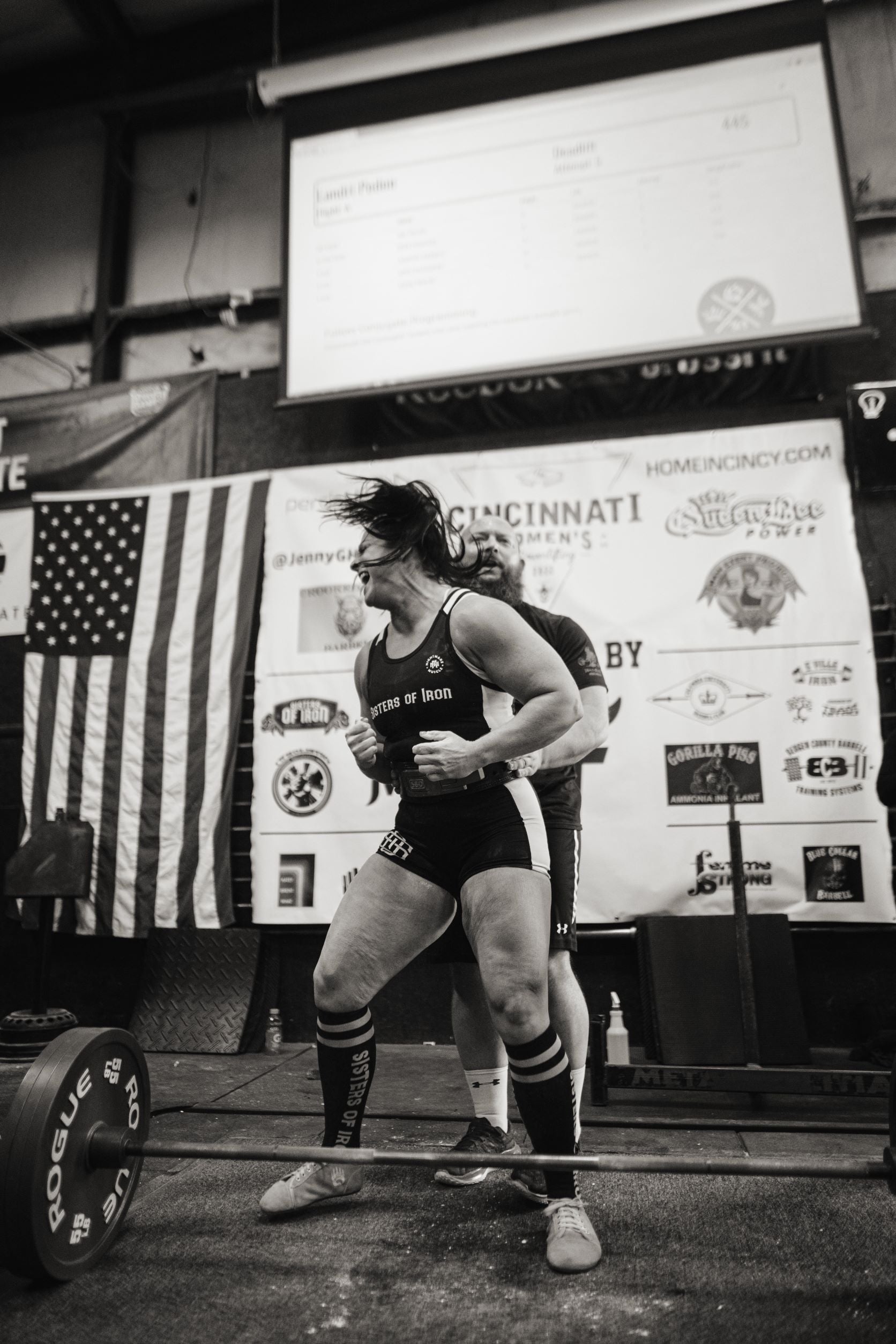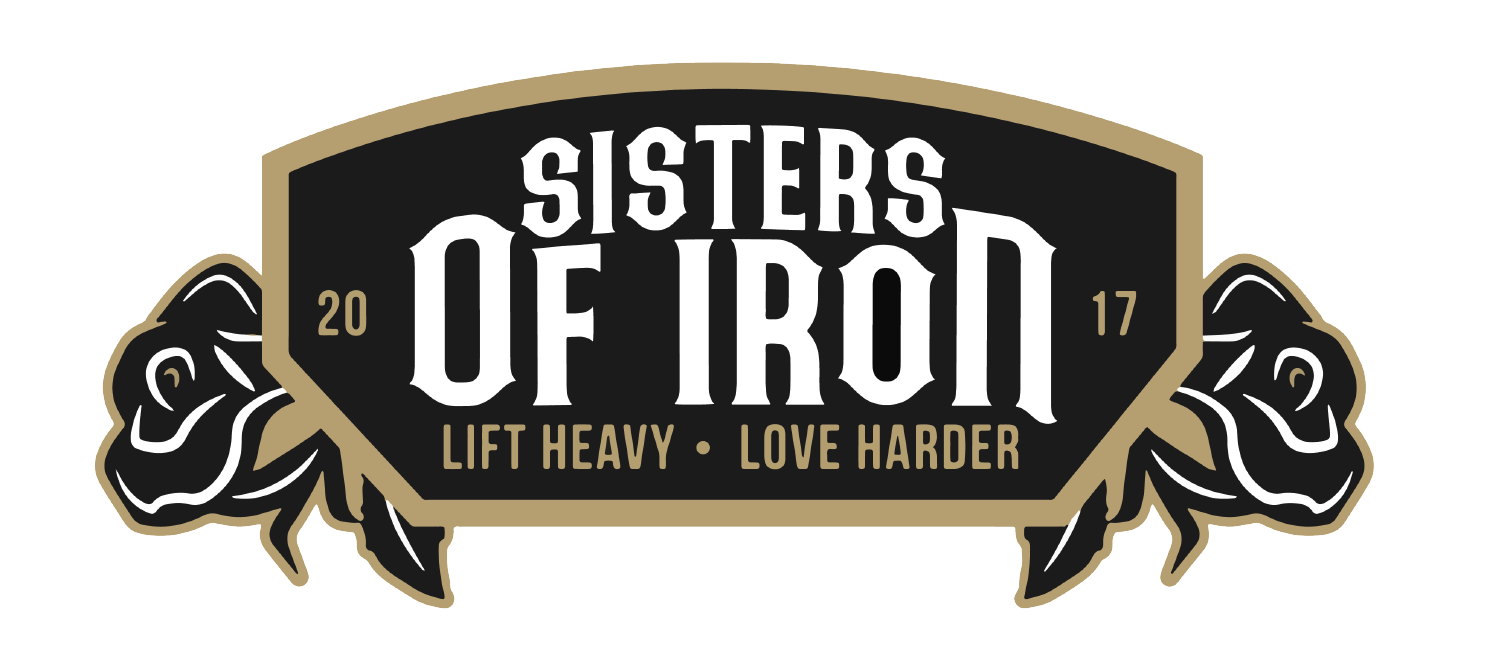Strength as Solace: Powerlifter Landri Peden / By Janna Moretti

“Powerlifting—to me—it’s my passion, my mental health. Powerlifting is what keeps me strong. It has allowed me to do what I thought I could not do.”
Sitting down to talk with Landri was rejuvenating. She was gracious during my internet instability, flexible when we had to move from Zoom to a good old-fashioned phone chat. A mother herself, she was patient when my daughter interrupted, bringing me a sandwich made of dried lentils, olives, highlighting the tomato from our garden.
Thank you for the trust, Landri, and thank you to Sisters of Iron for hosting these stories, these powerhouse women.
Powerlifter Landri Peden: Strength as Solace
Landri looks up to her grandfather. A man who leads from the heart, he raised her as his own while she was in high school, a turbulent time for many crossing from girl to woman. “He was airborne, and that inspired me to join the Army.” Landri served in the Army as a chemical operator from September 2004 to May 2013. “My job was to make grown men cry,” she joked, explaining that she ran gas chamber training for soldiers. The soldiers lined up and donned their gas masks into her chamber, wherein Landri would fire off CS gas and run them through the practice of taking off and putting on the masks while trying not to breath in the gas. A wet, snotty business, we laughed.
Having been a versatile athlete growing up, Landri was strong, competitive, and adept at physical training. But being a woman in the military, Landri felt like she was in a constant state of needing to prove herself. She used the terms isolation, competition.
“I felt the pressure to work harder because I was a woman. I didn’t want to be looked at as weak.”
That’s a common misconception for some men in the military: women are weak, unable to perform. Landri’s ability to navigate these pressures in the military stemmed from embracing strength as part of her identity. Strong meant survival. In perpetual readiness. Training to combat an attack, training for war, training for violence, training to be an instrument of violence—whether or not soldiers experience actual war—the training alone fosters a culture of invulnerability.
Here I think of studies done on brain imaging when people go through simulated threats versus actual threats, how the brain imaging shows that imagined threats impact physiology; imaging shows the lighting up of the same parts of the brain as when actual/real threats are experienced. Simulation provokes the mind in much the same way as reality. About her time in the Army, experiencing simulated and actual threats, Landri said, “Being in the Army showed me how to make it out of things I didn’t know that I could.” She brings that dynamic, limitless perspective to the platform later on—her ability to co-opt her mind in order to push past perceived physical limitations. She said, “Powerlifting keeps that drive, that need for survival going.”
Once Landri got out of the Army, darker times ensued. She was diagnosed with PTSD. She dealt with depression, anxiety. She was prescribed medication. The shift from military to civilian life often calls for a decompression period, especially if threatened or exposed to violence. About that time, Landri explained, “I used to be locked away, over 200 pounds, miserable, out of shape.”
A self-described introvert, being around large groups of people triggered her. During that time in her life, she often didn’t feel safe. But she was a mother, and, not wanting to be like her father who struggled with addiction his whole life—using drugs to fix him—she didn’t want to rely on medication to cope with her problems. A friend of hers suggested she get out and try CrossFit, so she did. And then she found solace in physical exertion. She began tapping into her old competitive self and signed up for local competitions. She continued to build her strength. And safety followed close behind. She started to feel healthier by way of fitness, and it was through CrossFit that she discovered that she was Strong, (big S intended). She took the leap down the rabbit hole to powerlifting and hasn’t looked back. Now she is an elite powerlifter. “I was prescribed 10 meds for anxiety, not sleeping, but I didn’t want that. I learned to cope with my scars with powerlifting.” She never took the medications.
The pursuit of strength as solace—as safety—has challenges. As with any journey, one crosses peaks and valleys. Though powerlifting has returned to Landri bigger pieces of herself, she struggled with hormone issues that complicated training and recovery. Her method of coping with trauma began to reveal its own complications. Though she trained consistently under her coach Shane Sweatt, and set the example of strength for other women whom she coached, her commitment to powerlifting was tested. As if powerlifting had given her this new way of experiencing life, it held out on her for a short time.
It was at this time when she found herself struggling to keep weight around a comfortable place, when her hormones were out of whack, that she competed on the Pro Day of the 2021 Women’s Pro-Am, that, depending on the outcome, could have left her questioning whether powerlifting was all that she had built it up to be in her mind. She was peaked on track to squat 430 pounds, but she only got her opener at 350 pounds. This was a major blow. She then went on to hit her opening bench at 200 pounds, but her second and third attempts were red-lighted. This was like pushing on a bruise. She went into the deadlifts feeling low. But moving past upsets is in her skillset. She was an athlete, a soldier, a mother. Onto the next moment she pulled her first and second deadlifts at 400 pounds and 430 pounds. Going for 445 pounds for her third attempt, there was a lot was on the line. Right before walking to the platform for her final pull, hands chalked, belt cinched, nerves raw—feeling the effects from her earlier performance, examining what powerlifting had come to represent to her, questioning where she’d been, where she could or should be but maybe wasn’t quite yet, with her head in that mess of thought her coach stepped up behind her, leaned to her and said go to war.
It was like the crowd vanished. Those words shut it down, shut out the mass, the triggering noise—mentally pushing her. She had in her power in that moment one thing to do, so she walked up to the bar, wrapped her hands around it, pulled the slack, and then heaved her weight against the bar, against the ground, against the room and the shit she didn’t want to have to deal with, and the things that she had no choice but to confront—and in that moment she emanated. She wasn’t running. She stood. She stood with 445 pounds in her hands, around 2.5 times her bodyweight. That pull wasn’t just a PR, or an exercise, or a way to keep her body in shape. That pull was her stand.
“It was redemption,” Landri said.
That pull meant her renewal, a reminder of why she powerlifts. That was the summit from which she could see the continued path forward. Since then, she has her gotten her health issues worked out too.
Competing can be a double-edged sword, a dichotomy, where reaching for great mental and physical triumph coincides with facing crowds that still trigger her. After explaining this she laughed, recalling what one of her friends had said to her about powerlifters. He had said, “When you talk to powerlifters about their past, you realize that most belong on the island with misfit toys.” I laughed because I understood. I suppose everyone has their own lows to sift through, whether they use powerlifting as a means to process or silo against. But it’s more than that too. Powerlifting isn’t just there for that. It gives back. It gives a lens for evaluation. It's objective. It is reliable. It’s a portal to darkness, to light. It’s the constant pursuit of maximum human strength, and like her friend once told her, “You gotta be a little crazy to be a powerlifter.”
For those who want to be trained by this powerhouse, Landri coaches women exclusively. She wants to provide a space for women to feel safe pursuing their highest selves through strength. Along with the psychological growth that she fosters in her clients, she passes along practical wisdom she’s learned through trial and error: don’t open too heavy at a meet, make bigger jumps when warming up, one may not want ammonia or slaps, one may seek the calm before the pull, only compete twice a year instead of burning out. She helps others reframe their perceived disappointment.
“I can’t stand when women say they have a poverty bench. I tell my clients who say this, ‘Think of all the people who can’t lift 110 pounds.’”
When Landri described how she reframes her clients’ upsets, I thought of the way a stage crew maneuvers lighting to cast shadows that highlight what’s needed in prominence. Landri helps to show these women a different side of who they are, that of which they are capable. I thought how incredible that the mind—the very thing that can harden for the sake of violence, the thing that can break down and mar vulnerability—can also build up some whole other level of knowing the self, of loving that which the body can do because the mind wills it.
Powerlifting has given much to Landri, whose legacy will be continuously built by her own personal growth and those who have the fortune of being cast upon by her glow.



Leave a comment